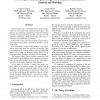Free Online Productivity Tools
i2Speak
i2Symbol
i2OCR
iTex2Img
iWeb2Print
iWeb2Shot
i2Type
iPdf2Split
iPdf2Merge
i2Bopomofo
i2Arabic
i2Style
i2Image
i2PDF
iLatex2Rtf
Sci2ools
FSKD
2007
Springer
2007
Springer
A First Step towards an Epistemology of the Subjective Uncertainty: Its Premises and Modeling
The uncertainty may be divides it into two major groups, "objective uncertainty" and "subjective uncertainty". The objective uncertainty has already been extensively explored in works on classic probability, but this is not the case with subjective uncertainty, a field of knowledge where there is not even a well established epistemology. In this work we show a first step towards an epistemology of the subjective uncertainty, its premises, and also a way to model them. If a system fails to model all the premises it will not be able to generically model the subjective uncertainty. This is what happens, for example, with the rules of combination until now used within the Dempster-Shafer Theory, one of the formal models that deals with subjective uncertainty. The Dempster-Shafer Theory provides a method for combining evidence from different sources without prior knowledge of their distributions, however, it has some pitfalls caused by an incomplete modeling of the prem...
| Added | 16 Aug 2010 |
| Updated | 16 Aug 2010 |
| Type | Conference |
| Year | 2007 |
| Where | FSKD |
| Authors | Fabio Campos, Andre Neves, R. Souza |
Comments (0)

